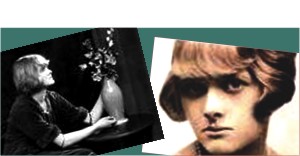| Author Profile
Daphne du Maurier
 English novelist, biographer, and playwright, who published romantic suspense novels, mostly set on the coast of Cornwall. Du Maurier is best known for REBECCA (1938), filmed by Alfred Hitchcock in 1940. Orson Welles's radio adaptation from 1938 also paved way for its success. The novel has been characterized as the last and most famous imitations of Charlotte Brontë's Jane Eyre (1847). English novelist, biographer, and playwright, who published romantic suspense novels, mostly set on the coast of Cornwall. Du Maurier is best known for REBECCA (1938), filmed by Alfred Hitchcock in 1940. Orson Welles's radio adaptation from 1938 also paved way for its success. The novel has been characterized as the last and most famous imitations of Charlotte Brontë's Jane Eyre (1847).
Daphne du Maurier was born in London into an artistic family. She was the granddaughter of caricaturist George du Maurier, her mother, Muriel Beaumont, was an actress, and her father was the actor-manager Sir Gerald du Maurier, who turned to writing and created the mad hypnotist Svengali. One of her ancestors was Mary Anne Clarke, the mistress of the duke of York, second son of King George III. She later became the heroine of du Maurier's novel MARY ANNE (1954). In 1831 Mary Anne Clarke's daughter married Louis-Mathurin Busson du Maurier. Her father Du Maurier portrayed in GERALD (1934). THE GLASS-BLOWERS (1963) was a novel about the Busson family.
Her first book, THE LOVING SPIRIT, appeared in 1931. It was followed by JAMAICA INN (1936), a historical tale of smugglers, which was bought for the movies, and directed by Alfred Hitchcock, who later used her short story, 'The Birds', a tense tale of nature turning on humanity, for another film production. Also Du Maurier's FRENCHMAN'S CREEK, a pirate romance, and MY COUSIN RACHEL (1951), were succesfully filmed.
In 1932 du Maurier married to Lieutenant Colonel Frederick Arthur Montague Browning II, who was knighted for his distinguished service during World War II. They were happily married for thirty-three years and had three children; Browning died in 1965. Du Maurier was made dame in 1969 for her literary distinction. She died on April 19, 1989. Her pictorial memoir, ENCHANTED CORNWALL, appeared posthumously in 1992. With her son, Christian, she published VANISHING CORNWALL in 1967. Like Rebecca, many of her novels and short stories were set in Cornwall, England's westernmost county, whose wild, stormy weather and wild past inspired her imagination. "Here was the freedom I desired, long sought-for, not yet known," she wrote in Vanishing Cornwall. "Freedom to write, to walk, to wander, freedom to climb hills, to pull a boat, to be alone." Du Maurier's home was at a seventeenth-century mansion, Menabilly, overlooking the sea, for a quarter of a century. The house became the scene of her historical novel THE KING'S GENERAL (1946).
Rebecca's opening line, "Last night I dreamt I went to Manderley again," is among the most memorable in twentieth-century literature. The story centers on a young and timid heroine. Her life is made miserable by her strangely behaving husband, Maxim de Winter, whom she just have married. Maxim is a wealthy widower, whose wife Rebecca has died in mysterious circumstances. His house is ruled by Mrs. Danvers, the housekeeper, who has made Rebecca's room a shrine. Du Maurier focuses on the fears and fantasies of the new wife, who eventually learns, that her husband did not love his former wife, a cruel, egoistical woman. Because of the familiar plot, suits of plagiarism were brought against du Maurier, but they were dropped when the widespread use of the theme, beginning from Charlotte Brontë's works, was established. Du Maurier's book, on the other hand, inspired Maureen Freely's novel The Other Rebecca (1996), in which the enigmatic Maxim de Winter appears as Max Midwinter.
Du Maurier started to write Rebecca while traveling in Egypt. She poured all of her own emotions in the central characted after learning about her husband's earlier live and his great love, Jan Ricardo, who had been an exotic, dark beauty.
Besides popular novels Du Maurier published short stories, plays, and biographies, among others Branwell Brontë's, the brother of sisters Anne, Charlotte, and Emily. Her biography of Francis Bacon, an English statesman in the 1500s and 1600s, appeared in 1976. Du Maurier's autobiography, GROWING PAINS, was published when she was 70. In the late 1950s, du Maurier began to take interest in the supernatural. During this period she wrote several stories, which explored fears and paranoid fantasies, among them 'The Pool', in which a young girl glimpses a magical world in the woods, but is later barred from it, and 'The Blue Lenses', in which a woman sees everyone around her having the head of an animal. In 1970 appeared her second collection of short stories, NOT AFTER MIDNIGHT, which included 'Don't Look Now', a tale set in Venice, involving a psychic old lady, a man with the sixth sense, and a murderous dwarf. A film version of the story, directed by Nicholas Roeg, was made in 1973. Du Maurier received in 1977 the Grand Master Award from the Mystery Writers of America.
Copyright
(R) thedailystar.net 2007 |
